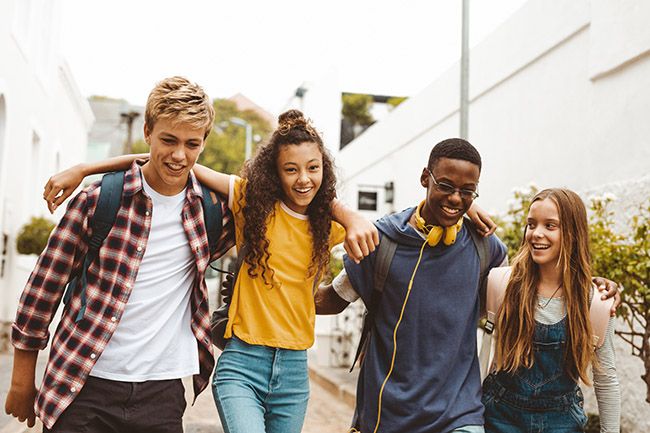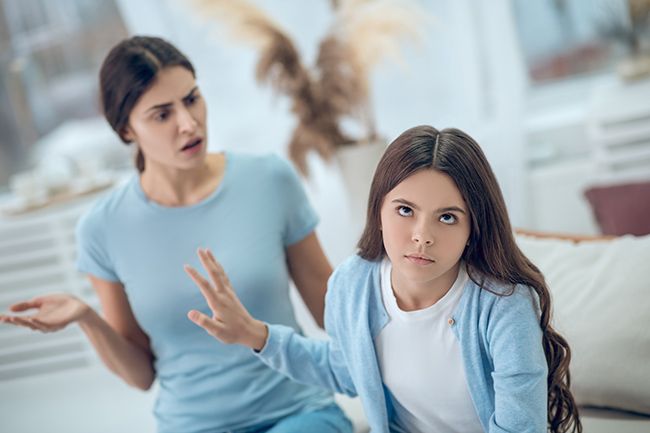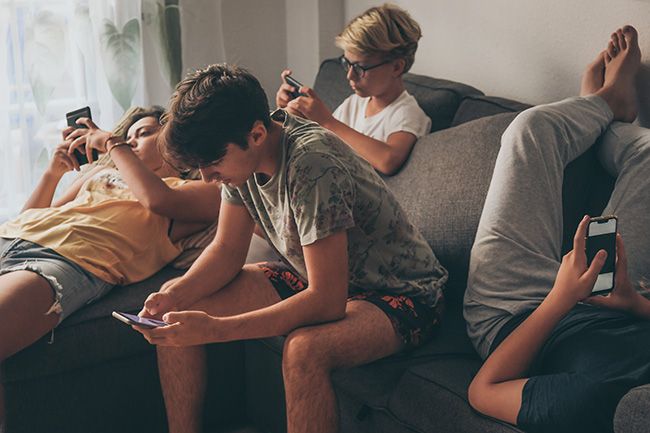The school summer holidays are just around the corner, and while keeping younger children entertained involves playdates and days out, planning activities for your teenagers can be a little trickier. How do you keep them off those screens?!
MORE: 19 cool school backpacks for teenage boys and girls
HELLO! talked to Dr. Jane Gilmour, Consultant Clinical Psychologist at Great Ormond Street Hospital and co-author of How to Have Incredible Conversations With Your Child and The Incredible Teenage Brain, for advice on the subject.
Dr. Jane says: "Summer holidays with a teenager is an art. There is strong brain science showing that teenage brains operate using a unique set of drives, so the best holiday strategy is to play to these strengths and ride on the crest of the teen brain wave rather than fight a battle against biology.
"Follow these steps to make your family's summer holidays are calmer, leaving your teen more self-aware, skilled and confident."
Plan for the holidays but give your teen a seat at the table
Do plan, but don't plan alone. Teenagers' brains respond well to the consultative mode, so sit down together and decide some key activities and goals for the summer break.
- Choose a time when you are both calm, well-rested and well-fed so you can think through any tricky areas of debate.
- You may need to pin down non-negotiable principles (like the curfew) and then discuss options around them.
- Ask your teen to research ideas for activities and then discuss them together.
- If your teen suggests reasonable ideas, go with them and you will have a young person who is highly engaged and learning how to be a community member.
- If you have a budget for summer activities, share the amount and ask them to investigate options that sit within their budget.
- Adolescents feel passionately about their world (it’s an important part of their development) - they love what they love deeply so support them to explore it (even if you don’t love it quite as much) because they will learn something about themselves in the process.
- Volunteering is good for you. Research shows that we feel rewarded when we do a good thing for others and that effect is strong for teenagers too. Ask them to name something they care about and volunteer time or raise money in support. Get creative – for example, this charity uses gaming to raise donations helpforheroes.org.uk
Create a holiday routine
Being off-timetable can feel a release at first but having no routine at all can be problematic. In fact, there is good evidence to show that routine can improve wellbeing so get together and agree a daily holiday routine.
- House rules are likely to be different during school holidays but they should still be consistent and explicit so that everyone has the same expectations.
- Teens sometimes become virtually nocturnal during their holidays, and though their body clock is slightly later, don’t let it get too extreme. Consider listing daily tasks like having had breakfast and doing teeth by a certain time.
- You may want to suggest they complete basic tasks before using their phone. This is highly motivating.
MORE: Prince William and Duchess Kate's summer plans with children George, Charlotte and Louis
Screens have a place but set some agreed boundaries
Teenagers are wired to connect with their peers and to search for novelty. This means that devices are highly attractive to teens specifically, as they stand for 'friends and trends'.
- It’s likely that there will be more screen time when school’s out but it is important to ring-fence screen-free time. Usually, the easiest thing to do is to have regular screen times and screen-free periods.
- Agree holiday screen time rules together (remember the drive for respect and consultation is strong in adolescents). Set out how much time you think should be screen-free in the day and then perhaps ask your teen to suggest when it happens.
- There is strong evidence that phones impact on sleep, so it is recommended that phones are out of bedrooms at night. This may be non-negotiable but you could be open to when they would like to use their phone at other times, particularly if this is a new rule in your house.
- Make sure you differentiate between passive and active screen time. For example, talking with a friend on a video call is likely to be good for your teenagers' mental health. Whereas scrolling through social media aimlessly is OK (so long as it doesn’t make your teenager feel anxious or low) but should be limited. Remember we all have activities that aren't strictly speaking ideal pastimes, so keep perspective.
- Consider allowing your teen to create content for a social media channel (perhaps a private account and/or anonymised). This is a cunning way of inviting them to learn about the world but Vlog or record it digitally. Encourage them to keep a video diary as they learn a skill, review world events, or test out then recommend good local bike routes. By making an activity available to their wider social group in the digital world, it is likely to be more engaging for a teen.
Holidays are a chance to learn life skills
The holidays are a gift for life skill development because you need time to learn any new skill.
- Agree a life skill to learn, like navigating the bus routes, budgeting and buying food or cooking a meal once a week.
- Tempting though it might be, don’t simply list household tasks that need to be done, include life skills that need interaction with the outside world. These might be more appealing and are just as useful.
- The golden rules when learning new skills are repetition and gradual steps that push limits but increase at a rate that is manageable.
- You may need to help them talk through planned steps first or they may want to try it out independently and learn from their experiences firsthand. Both have a place in learning life skills.
- Make sure you manage expectations appropriately and expect mistakes. Learning any new skill is hard.
Take good risks
Teenagers are more likely to want to take risks – it is not just a stereotype.
The summer of 2022 is the first restriction-free summer for two years, so expectations might be high and plans to explore the world might be ambitious. Before you break into a cold sweat, consider this: risk-taking is a good thing.
A risk simply means that the outcome is unknown; it means you finding out something new and perhaps learning the experience of failure. All part of personal development. Dangerous risks should be avoided but many risks are positive, like taking a chance on an offer or starting a new activity and these should be encouraged.
- ·Don’t be tempted to move your boundaries as a compensation to your teen for missing out on activities in previous years.
- Science shows that the same people who take dangerous risks also take good risks, so direct your teen to good risks and it will feed their need for risk.
- Look at the life skill and screen sections again: Finding the bus route or Vlogging about a new skill are actually risks.
MORE: Real life: Former couple who co-parent and still holiday as a family share their story
Meltdowns
Meltdowns can be more common during the holidays and are certainly more likely during the teenage years.
Teens feel emotions more acutely than they ever have felt them before. It’s the brain’s way of learning about the environment and the teen brain wants to learn quickly before adulthood starts.
Meltdowns almost certainly have a trigger. You and your teen might not know the trigger in the moment, but there will be one in there somewhere. It’s also worth considering that holiday meltdowns can be due to a change in sleep or diet as evidence shows a tired or hungry brain is much more likely to be irritable.
So what do you do in the moment?
- Just stay close – don’t say much but stay around them as it will help them settle quicker
- Describe the emotion you see without judgment (naming the emotion can help calm the brain)
- Listen to what they are saying (this doesn't mean you agree with what they are saying)
- Paraphrase what they said (if they feel heard they won't need to up the ante emotionally)
- Don’t attempt to discuss or debate the issue in any depth in the moment.
- Wait until you are both calm – it may take hours or even days – and then think about what happened, why it happened and what you should do next.
Get bored
Some predictability, planning and novelty is certainly a good idea but don’t schedule every moment of every day. Figuring out what to do with free time is a life skill too and it is a good idea to be bored sometimes.
This piece of advice might surprise you, but it’s very important to allow (and encourage) your teen to feel bored for brief periods.
Boredom includes doing an activity that doesn’t excite you when your mind is elsewhere or simply daydreaming. When we are zoning out (in 'Default Mode') we are awake but not really focussed and our brain does extraordinary things: it reflects on the past, visualises the future and considers social perspectives.
It is highly unlikely to happen with devices around, so make sure you schedule some guaranteed screen-free time during the day and embrace the boredom. .
Give yourself a break
It’s your holiday too, so make sure you look after yourself.
The advantage of a well-planned and agreed schedule with downtime, screen time and activity time is that you can see the windows of opportunity for some well-earned me time too.
Dr. Jane Gilmour, Consultant Clinical Psychologist at Great Ormond Street Hospital and co-author of How to Have Incredible Conversations With Your Child and The Incredible Teenage Brain
Like this story? Sign up to the HELLO! Family Hub newsletter to get other stories like this delivered straight to your inbox.












